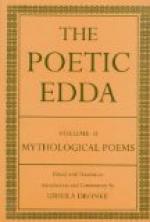This narrative is also told in the pieces of prose interspersed through Reginsmal. The verse consists only of scraps of dialogue. The first of these comprises question and answer between Loki and the dwarf Andvari in the form of the old riddle-poems, and seems to result from the confusion of two ideas: the question-and-answer wager, and the captive’s ransom by treasure. Then follows the curse, in less general terms than in the prose: “My gold shall be the death of two brothers, and cause strife among eight kings; no one shall rejoice in the possession of my treasure.” Next comes a short dialogue between Loki and Hreidmar, in which the former warns his host of the risk he runs in taking the hoard. In the next fragment Hreidmar calls on his daughters to avenge him; Lyngheid replies that they cannot do so on their own brother, and her father bids her bear a daughter whose son may avenge him. This has given rise to a suggestion that Hjoerdis, Sigurd’s mother, was daughter to Lyngheid, but if that is intended, it may only be due to the Norse passion for genealogy. The next fragment brings Regin and Sigurd together, and the smith takes the young Volsung for his foster-son. A speech of Sigurd’s follows, in which he refuses to seek the treasure till he has avenged his father on Hunding’s sons. The rest of the poem is concerned with the battle with Hunding’s race, and Sigurd’s meeting with Odin by the way.
The fight with Fafni is not described in verse, very little of this poetry being in narrative form; but Fafnismal gives a dialogue between the wounded dragon and his slayer. Fafni warns the Volsung against the hoard: “The ringing gold and the glowing treasure, the rings shall be thy death.” Sigurd disregards the warning with the maxim “Every man must die some time,” and asks questions of the dragon in the manner of Vafthrudnismal. Fafni, after repeating his warning, speaks of his brother’s intended treachery: “Regin betrayed me, he will betray thee; he will be the death of both of us,” and dies. Regin returning bids Sigurd roast Fafni’s heart, while he sleeps. A prose-piece tells that Sigurd burnt his fingers by touching the heart, put them in his mouth, and understood the speech of birds. The advice given him by the birds is taken from two different poems, and partly repeats itself; the substance is a warning to Sigurd against the treachery plotted by Regin, and a counsel to prevent it by killing him, and so become sole owner of the hoard. Sigurd takes advantage of the warning: “Fate shall not be so strong that Regin shall give my death-sentence: both brothers shall go quickly hence to Hel.” Regin’s enjoyment of the hoard is therefore short. The second half of the story begins when one of the birds, after a reference to Gudrun, guides Sigurd to the sleeping Valkyrie:




